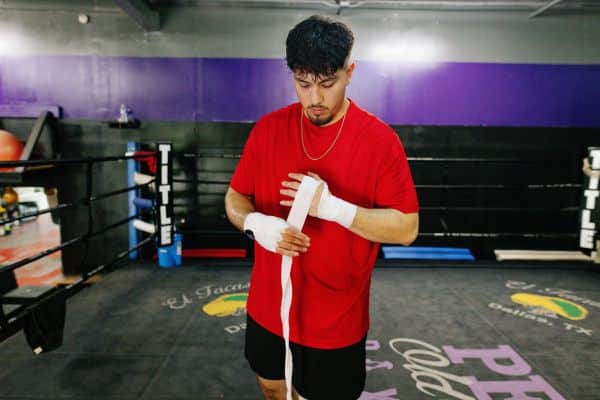Amateur boxer Alberto Baez was back in the gym weeks after an undiagnosed heart condition led to a stroke and a weeklong stay at Methodist Midlothian Medical Center, where he was treated with the clot-busting drug TNK.
“I was paralyzed completely on the left side,” says the 22-year-old Dallas resident, who spent six days a week in the ring before his January 2024 ER visit. “I couldn’t move anything.”
Alberto praised the response from the award-winning emergency department team at Methodist Midlothian for his rapid recovery — aided by a newly adopted clot-busting treatment known as tenecteplase, or TNK.
“They asked me and my parents if I wanted to try that,” Alberto recalls. “And within an hour or two, the feeling started coming back. I could move my fingers and my toes and eventually the rest of me on down the line.”
Within a couple of weeks, Alberto was back on his feet and ready to resume light training, thanks to the care he received at Methodist Midlothian.
“Everyone was perfect,” he says. “I’ve never been in a hospital like that. Everyone taking care of me was nice. I feel lucky it happened where it happened.”

A STROKE WITHOUT WARNING
It happened about three minutes from Methodist Midlothian, while Alberto was delivering bread to a store just down the road.
“I had just finished the delivery when I noticed my arm giving out,” he says. “It’s kind of weird to explain, but my arm just started swinging by itself, and then I couldn’t talk.”
Alberto walked outside to see if some fresh air would help, but halfway to his car, he started limping and ultimately collapsed.
“Then boom — I just fell over,” he says.
What Alberto didn’t know at the time was that he had a hole between the two upper chambers of his heart — a condition known as a patent foramen ovale, or PFO.
“Approximately 25% of the adult population has a PFO,” says Akash Ghai, MD, cardiologist on the medical staff at Methodist Midlothian. “The risk of a stroke in patients younger than 55 is three times higher if they have a PFO.”
In the vast majority of cases, Dr. Ghai says, patients like Alberto lead normal lives and may never know they have a PFO, a hole that normally closes shortly after birth and can often be detected with a heart ultrasound, also known as a transthoracic echocardiogram (TTE).
“For those who have had a stroke or, rarely, severe migraine headaches from the PFO, we strongly recommend closure of the hole,” Dr. Ghai says.

NEW USE FOR CLOT-BUSTING DRUG
But first doctors would have to treat Alberto for the stroke, and that’s where a clot-busting drug long used for heart attacks would come in.
“The health system just moved from using tPA for stroke to TNK,” says Benjamin Lo, MD, medical director of the emergency department at Methodist Midlothian, “and Alberto was one of our first cases to use TNK at Midlothian.”
Unlike tPA — short for tissue plasminogen activator — TNK can be administered in a single injection, rather than an initial injection followed by an IV drip that lasts an hour.
“TNK can be given quicker, and it’s easier for the nursing staff to administer,” Dr. Lo says. “Time is so critical when treating strokes. We can save more brain function because the medication can be given faster.”
Dr. Lo says Alberto came in with significant stroke symptoms, including facial droop, arm weakness, and speech problems. All of that changed quickly after a dose of TNK, which can quickly dissolve blood clots in the brain.
“Everything got better after the medication, so it was a really good case,” Dr. Lo says. “It was a good catch because it’s rare to have a stroke when you’re as young as him.”

GETTING BACK TO BOXING
Alberto spent a week recovering at Methodist Midlothian, where a nurse told him that his age and fitness level would help him return to normal in short order.
“She heard that I worked out,” he says. “So she was like, ‘Just take it slowly, and everything should come back eventually.’”
“Eventually” wound up being just two weeks. Alberto was back in the gym by February, still not at full strength but feeling good enough to rehab like the athlete he is.
Even so, Dr. Ghai warns that heavy lifting and resistance training should wait until he gets the hole in his heart repaired.
“In general, a PFO doesn’t cause symptoms or health complications, but it can increase your risk for developing migraine headaches, stroke, and low oxygen levels while lying flat,” he says. “Certain exercises such as lifting weights and resistance training can increase the risk.”
Alberto may be taking it easy for now, but going pro is still the second-generation boxer’s dream.
“I was training six days a week before,” he says. “Now I don’t try to push myself too hard because they told me in the hospital not to. But only time will tell.”






